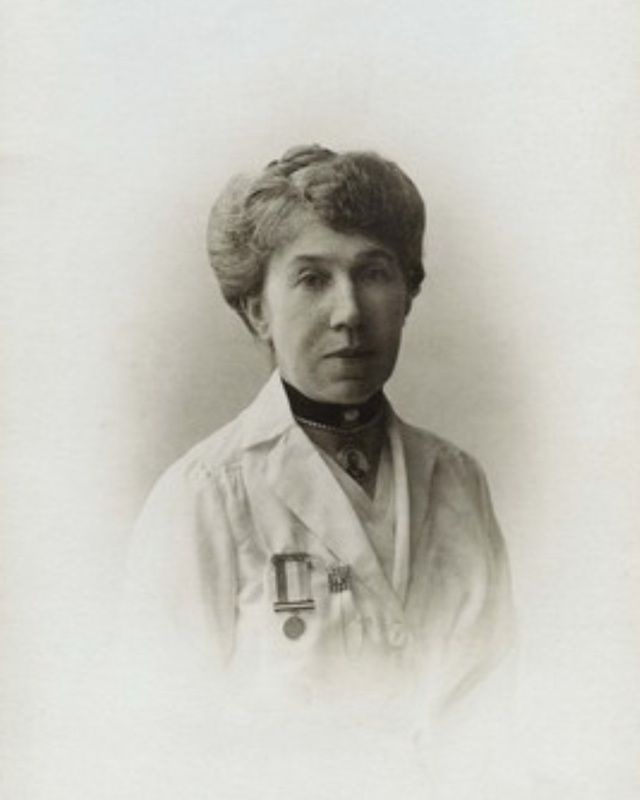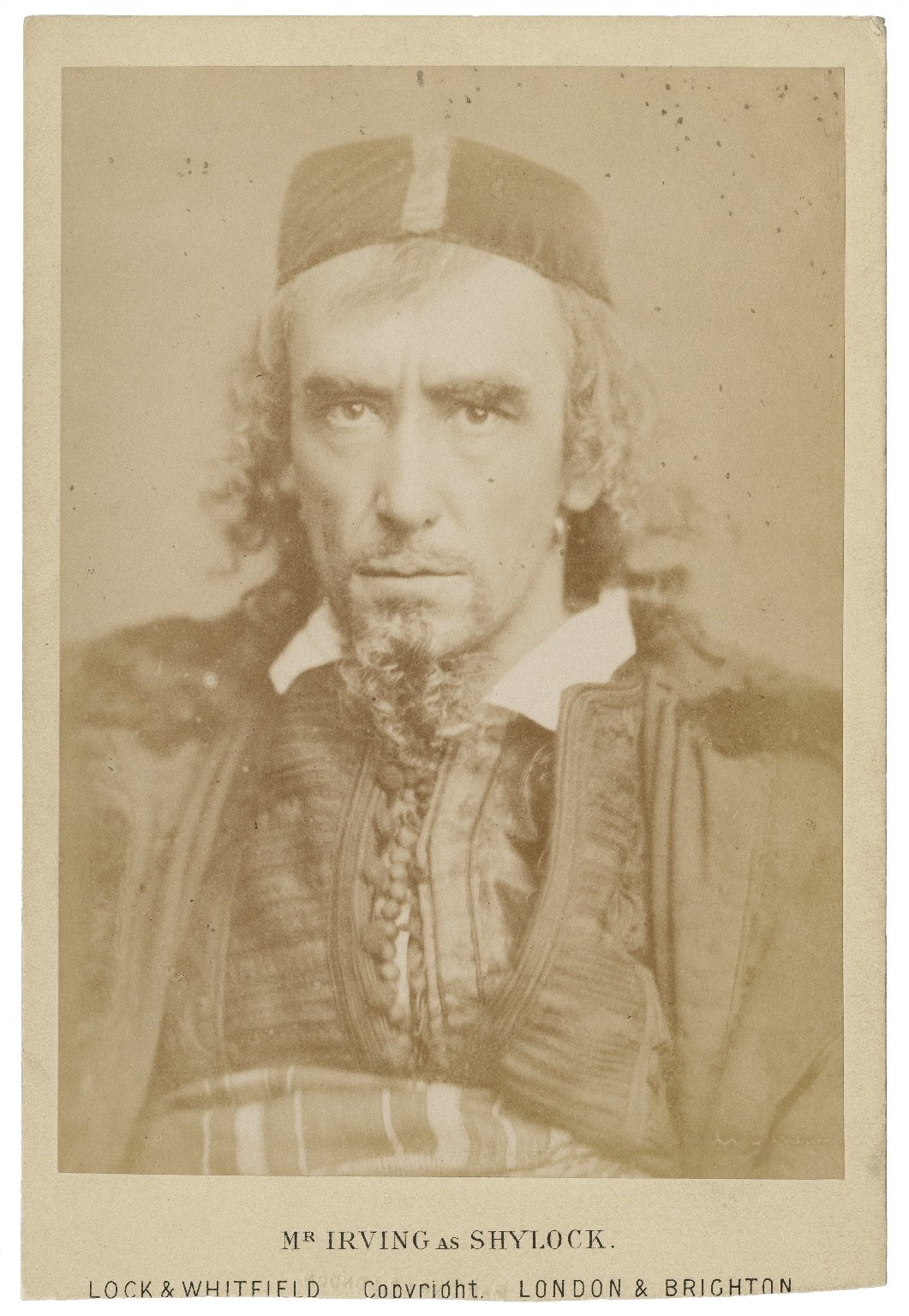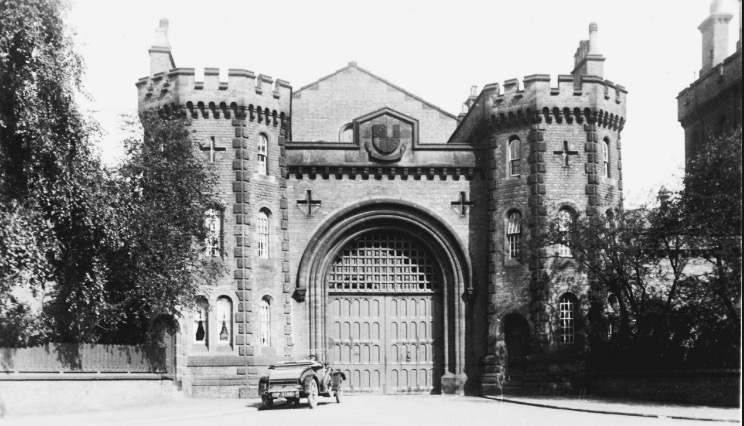|
Doreen Allen
Doreen Allen (1879 – 18 June 1963) was a militant English suffragette and member of the Women's Social and Political Union (WSPU), who on being imprisoned was force-fed, for which she received the WSPU's Hunger Strike Medal '''For Valour'''. Life She was born in Dartford in Kent as Edith Doreen Allchin, one of ten children of Mary Ann ''née'' Amos (1838–1924) and John James Allchin (1836–1903), a builder. In 1905 she married Melville Hodsoll Allen (1879–1932) who worked at the Stock Exchange in London and who served in World War I as a captain in the Queen's Own Royal West Kent Regiment. Following her arrest in March 1912 for taking part in a window smashing campaign she appeared at Bow Street Magistrates' Court on 12 March 1912, before being sent for trial at the London Sessions on 19 March 1912, when she was sentenced to four months imprisonment in Holloway Prison; in prison she went on hunger strike and was force-fed. A fellow-prisoner in Holloway was Ma ... [...More Info...] [...Related Items...] OR: [Wikipedia] [Google] [Baidu] |
Edith Doreen Allen Suffragette
Edith is a feminine given name derived from the Old English words ēad, meaning 'riches or blessed', and is in common usage in this form in English, German, many Scandinavian languages and Dutch. Its French form is Édith. Contractions and variations of this name include Ditte, Dita, and Edie. It was a common first name prior to the 16th century, when it fell out of favour. It became popular again at the beginning of the 19th century, and in 2016 it was ranked at 488th most popular female name in the United States, according to the Social Security online database. It became far less common as a name for children by the late 20th century. The name Edith has five name days: May 14 in Estonia, January 13 in the Czech Republic, October 31 in Sweden, July 5 in Latvia, and September 16 in France, Hungary, Poland and Lithuania. Edith *Edith of Polesworth (died c. 960), abbess *Edith of Wessex (1025–1075), Queen of England * Edith of Wilton (961–984), English nun *Edith the ... [...More Info...] [...Related Items...] OR: [Wikipedia] [Google] [Baidu] |
Janie Terrero
Janie Terrero (14 April 1858 – 22 June 1944) was a militant suffragette who, as a member of the Women's Social and Political Union (WSPU), was imprisoned and force-fed for which she received the WSPU's Hunger Strike Medal. Early life Born as Jane Beddall in Finchingfield in Essex in 1858, she was the youngest daughter of Eliza, née Fitch, (1815-) and Thomas Beddall (1795–1865), a gentleman farmer. Hers was a comfortable middle-class upbringing with two servants. She married Máximo Manuel Juan Nepomuceno Terrero y Ortiz de Rosas (1856–1926), known as Manuel Terrero, the son of Manuela Rosas and the grandson of General Juan Manuel de Rosas, in December 1885.Maureen Daly Goggin and Beth Fowkes Tobin (eds''Women and Things, 1750-1950: Gendered Material Strategies'' Routledge (2016) - Google Books pg. 20 The couple lived at Fir Tree Lodge on Bannister Road in Southampton from 1898 to 1910 when they moved to 'Rockstone House' in Pinner, Middlesex, which was built for them ... [...More Info...] [...Related Items...] OR: [Wikipedia] [Google] [Baidu] |
Sussex
Sussex (), from the Old English (), is a historic county in South East England that was formerly an independent medieval Anglo-Saxon kingdom. It is bounded to the west by Hampshire, north by Surrey, northeast by Kent, south by the English Channel, and divided for many purposes into the ceremonial counties of West Sussex and East Sussex. Brighton and Hove, though part of East Sussex, was made a unitary authority in 1997, and as such, is administered independently of the rest of East Sussex. Brighton and Hove was granted city status in 2000. Until then, Chichester was Sussex's only city. The Brighton and Hove built-up area is the 15th largest conurbation in the UK and Brighton and Hove is the most populous city or town in Sussex. Crawley, Worthing and Eastbourne are major towns, each with a population over 100,000. Sussex has three main geographic sub-regions, each oriented approximately east to west. In the southwest is the fertile and densely populated coastal ... [...More Info...] [...Related Items...] OR: [Wikipedia] [Google] [Baidu] |
Brighton
Brighton () is a seaside resort and one of the two main areas of the City of Brighton and Hove in the county of East Sussex, England. It is located south of London. Archaeological evidence of settlement in the area dates back to the Bronze Age, Roman and Anglo-Saxon periods. The ancient settlement of "Brighthelmstone" was documented in the ''Domesday Book'' (1086). The town's importance grew in the Middle Ages as the Old Town developed, but it languished in the early modern period, affected by foreign attacks, storms, a suffering economy and a declining population. Brighton began to attract more visitors following improved road transport to London and becoming a boarding point for boats travelling to France. The town also developed in popularity as a health resort for sea bathing as a purported cure for illnesses. In the Georgian era, Brighton developed as a highly fashionable seaside resort, encouraged by the patronage of the Prince Regent, later King George IV, who spent ... [...More Info...] [...Related Items...] OR: [Wikipedia] [Google] [Baidu] |
HM Prison Exeter
HM Prison Exeter is a category B local and resettlement men's prison, located in Exeter in the county of Devon, England. It holds men sentenced by the courts of Devon, Cornwall, Dorset and Somerset. There are also prisoners from further afield who have been transferred from other prisons. Exeter Prison is operated by His Majesty's Prison Service. History In the reign of King Henry I (1100–1135) the manor of Bicton, near Exeter, was granted by the king to John ''Janitor'', who held the manor by the feudal tenure of grand serjeanty requiring him to provide a county jail, which was an honourable position of trust. The Latin noun ''Janitor'' means "door-keeper", generally understood in the sense ''janitor carceris'', "door-keeper of a jail". Thus the tenant took his surname from his form of tenure. The county prison was later transferred to a building beneath Exeter Castle in the county capital Exeter, but the feudal tenant of Bicton was nevertheless for many centuries req ... [...More Info...] [...Related Items...] OR: [Wikipedia] [Google] [Baidu] |
Prisoners (Temporary Discharge For Ill Health) Act 1913
The Prisoners (Temporary Discharge for Ill Health) Act, commonly referred to as the Cat and Mouse Act, was an Act of Parliament passed in Britain under H. H. Asquith's Liberal government in 1913. Some members of the Women's Social and Political Union (WSPU, commonly referred to as suffragettes) had been imprisoned for acts of vandalism in support of women's suffrage. In protest at being imprisoned, some of the suffragettes undertook hunger strikes. The hunger strikers were force-fed by the prison staff, leading to a public outcry. The act was a response to the protestations. It allowed the prisoners to be released on licence as soon as the hunger strike affected their health; they then had a predetermined period of time in which to recover after which they were rearrested and taken back to prison to serve out the rest of their sentence. Conditions could be placed on the prisoner during the time of their release. One effect of the act was to make hunger strikes technically legal. Th ... [...More Info...] [...Related Items...] OR: [Wikipedia] [Google] [Baidu] |
Plymouth
Plymouth () is a port city status in the United Kingdom, city and unitary authority in South West England. It is located on the south coast of Devon, approximately south-west of Exeter and south-west of London. It is bordered by Cornwall to the west and south-west. Plymouth's early history extends to the Bronze Age when a first settlement emerged at Mount Batten. This settlement continued as a trading post for the Roman Empire, until it was surpassed by the more prosperous village of Sutton founded in the ninth century, now called Plymouth. In 1588, an English fleet based in Plymouth intercepted and defeated the Spanish Armada. In 1620, the Pilgrim Fathers departed Plymouth for the New World and established Plymouth Colony, the second English settlement in what is now the United States of America. During the English Civil War, the town was held by the Roundhead, Parliamentarians and was besieged between 1642 and 1646. Throughout the Industrial Revolution, Plymouth grew as a ... [...More Info...] [...Related Items...] OR: [Wikipedia] [Google] [Baidu] |
Women's Suffrage
Women's suffrage is the right of women to vote in elections. Beginning in the start of the 18th century, some people sought to change voting laws to allow women to vote. Liberal political parties would go on to grant women the right to vote, increasing the number of those parties' potential constituencies. National and international organizations formed to coordinate efforts towards women voting, especially the International Woman Suffrage Alliance (founded in 1904 in Berlin, Germany). Many instances occurred in recent centuries where women were selectively given, then stripped of, the right to vote. The first place in the world to award and maintain women's suffrage was New Jersey in 1776 (though in 1807 this was reverted so that only white men could vote). The first province to ''continuously'' allow women to vote was Pitcairn Islands in 1838, and the first sovereign nation was Norway in 1913, as the Kingdom of Hawai'i, which originally had universal suffrage in 1840, ... [...More Info...] [...Related Items...] OR: [Wikipedia] [Google] [Baidu] |
Shylock
Shylock is a fictional character in William Shakespeare's play ''The Merchant of Venice'' (c. 1600). A Venetian Jewish moneylender, Shylock is the play's principal antagonist. His defeat and conversion to Christianity form the climax of the story. Shylock's characterisation is composed of stereotypes, for instance greediness and vengefulness, although there were no practising Jews who lived in England during Shakespearean England. Jews were expelled from the country in 1290 by Edward I in the Edict of Expulsion; this was not reversed until the Cromwell Era. Name Shylock is not a Jewish name. However, some scholars believe it probably derives from the biblical name Shalah, which is (''Šélaḥ'') in Hebrew. Shalah is the grandson of Shem and the father of Eber, biblical progenitor of Hebrew peoples. All the names of Jewish characters in the play derive from minor figures listed in genealogies in the Book of Genesis. It is possible that Shakespeare originally intended ... [...More Info...] [...Related Items...] OR: [Wikipedia] [Google] [Baidu] |
Evaline Hilda Burkitt
Evaline Hilda Burkitt (19 July 1876 – 7 March 1955) was a British suffragette and member of the Women's Social and Political Union (WSPU). A militant activist for women's rights, she went on hunger strike in prison and was the first suffragette to be forcibly-fed. Between 1909 and 1914 she was force-fed 292 times and was the last woman to be so treated in Holloway Prison. She was a recipient of the WSPU's Hunger Strike Medal. Life and Activism Evaline Hilda Burkitt was born in Wolverhampton in 1876, the fifth of nine children born to Laura ''née'' Clews (1843–1909) and Reuben Lancelot Burkitt (1847–1928). The children were well educated, including the girls. Burkitt was interested in reading, needlework and gardening. She lived with her wealthy grandparents Clarissa and Charles Burkitt until she was 25 years old, and then rejoined her family, who had moved to Birmingham. She moved in with her elder sister Christobel, her husband Frederick, and their baby, Kathleen. ... [...More Info...] [...Related Items...] OR: [Wikipedia] [Google] [Baidu] |
The Merchant Of Venice
''The Merchant of Venice'' is a play by William Shakespeare, believed to have been written between 1596 and 1598. A merchant in Venice named Antonio defaults on a large loan provided by a Jewish moneylender, Shylock. Although classified as a comedy in the First Folio and sharing certain aspects with Shakespeare's other romantic comedies, the play is most remembered for its dramatic scenes, and it is best known for the character Shylock and his famous demand for a " pound of flesh" in retribution. The play contains two famous speeches, that of Shylock, "Hath not a Jew eyes?" on the subject of humanity, and that of Portia on " the quality of mercy". Debate exists on whether the play is anti-Semitic, with Shylock's insistence on his legal right to the pound of flesh being in opposition to Shylock's seemingly universal plea for the rights of all people suffering discrimination. Characters * Antonio – a prominent merchant of Venice in a melancholic mood. * Bassanio � ... [...More Info...] [...Related Items...] OR: [Wikipedia] [Google] [Baidu] |
Janet Boyd
Janet Augusta Boyd (née Haig; 1850 – 22 September 1928) was a member of the Women's Social and Political Union (WSPU) and militant suffragette who in 1912 went on hunger strike in prison for which action she was awarded the WSPU's Hunger Strike Medal. Early years Born as Janet Augusta Haig into an upper middle-class family in Marylebone in Middlesex in 1850, she was the daughter of George Augustus Haig (1820-1906), a merchant and landowner from Pen Ithon, Radnorshire, Wales, and his wife, Anne Eliza ( Fell; 1822-1894). Her father was of Scotland, Scottish descent and was a cousin of Douglas Haig, 1st Earl Haig, Douglas Haig. Her sisters and fellow suffragettes were Charlotte and Sybil Thomas, Viscountess Rhondda, Sybil (later Viscount Rhondda, Viscountess Rhondda), while her niece was the feminist and suffragette Margaret Haig Thomas, 2nd Viscountess Rhondda, Margaret Thomas, who herself became the second Viscountess Rhondda. In 1874, Janet Haig married solicitor George Fenw ... [...More Info...] [...Related Items...] OR: [Wikipedia] [Google] [Baidu] |









